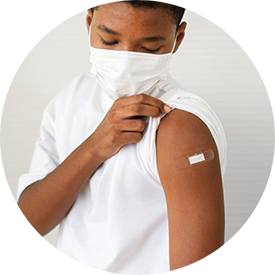
DURHAM, N.C. -- Unvaccinated students had eight times the incidence of COVID-19 infection compared to vaccinated students in a North Carolina independent school, according to a study by the ABC Science Collaborative appearing online Feb. 22 in the journal Pediatrics.
Researchers analyzed COVID-19 data from more than 1,100 students in grades 6-12 from Aug. 1-Nov. 12, 2021. During the study period, the Centers for Disease Control and Prevention classified COVID-19 county transmission as high, and the Delta variant comprised more than 99% of infections in the region.
School policy required universal masking indoors after Aug. 9, 2021. The school’s ventilation system used upgraded air filters but did not install high efficiency particulate air (HEPA) filters. Physical distancing was minimal, and there was no routine surveillance testing of students or staff.
As of November 2021, the school reported 829 (73.5%) students in grades 6-12 were vaccinated and 299 (26.5%) were unvaccinated. Twenty unvaccinated students reported a COVID-19 infection during the study period, compared to seven vaccinated students. Among the unvaccinated students who tested positive for COVID=19, 16 were symptomatic, compared to five of the vaccinated students.
Of the 27 infections, only two were classified as within-school transmissions, both a result of unmasked exposures to unvaccinated cases.
Vaccine effectiveness against COVID-19 infection in this study was 88%, providing evidence that vaccination is a critical component of safely continuing in-person education.
Unvaccinated students had eight times higher incidence of documented COVID-19 infection. Less than 1% of vaccinated students reported infection.
“These findings indicate that vaccination, along with other school-based safety measures, such as masking, play a critical role in minimizing transmissions within schools and keeping students in school,” said Ibukun Kalu, MD, assistant professor in the Department of Pediatrics at Duke University School of Medicine. “As school districts lift universal masking policies, being vaccinated becomes the strongest tool to prevent COVID-19 in students.
Providence Day School student Pavan Thakkar, in partnership with the ABC Science Collaborative, conceptualized and designed the study, drafted the initial manuscript, reviewed and revised the manuscript, designed the data collection instruments, collected data, and carried out the initial analyses.
About The ABC Science Collaborative
The ABC Science Collaborative is an initiative that extends across 18 states, connecting scientists and physicians with school and community leaders to help understand the most current and relevant information about COVID-19. The program helps school leaders and state policymakers arrive at informed decisions about returning to school using data from their own communities. Our shared goal is to keep students, teachers, and their local communities healthy and safe.
This research was funded by the Trial Innovation Network, which is an innovative collaboration addressing critical roadblocks in clinical research and accelerating the translation of novel interventions into life-saving therapies; the National Institute of Child Health and Human Development (NICHD) contract for the Pediatric Trials Network; and the Rapid Acceleration of Diagnostics Underserved Populations (RADx-UP).
This article was originally published on the ABC Collaborative website.